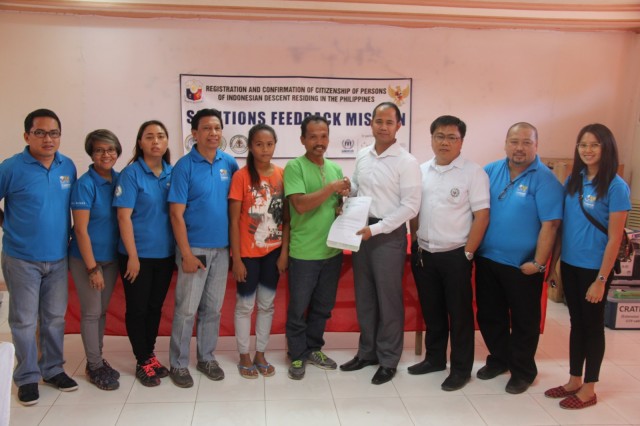DAVAO CITY (MindaNews/14 March) – At least 664 of 8,745 Persons of Indonesian Descent (PIDs) residing in seven provinces and two cities in Mindanao ended their statelessness Monday with confirmation and registration of their citizenship in ceremonies held in Glan, Sarangani.
The PIDs are mostly second and third generation descendants of those who left Indonesia in a mixed-migratory flow to nearby countries, the United Nations High Commissioner for Refugees (UNHCR) said in a press statement.
“Stateless people and those at risk of statelessness are sometimes not registered in either country and have lost their connection with their former countries of origin. Some live in remote areas or have limited access to information about their rights and nationality procedures,” the UNHCR said.
 END OF STATELESSNESS. Photo shows the first family to be confirmed by the Philippine and Indonesian governments as Indonesian citizens: Mr. Kampiong Monoke and daughter Rachelle Joy Monoke (center). From left to right: Atty. Melvin Suarez from the Department of Justice (DOJ), Meck Magno from the United Nations High Commissioner for Refugess, Dinah Jean Cornejo from the Public Attorney’s Office, Atty. Alex Bacarro from DOJ, Rachelle Monoke, Kampiong Monoke, Agus Majid, Vice-Consul at Indonesian Consulate in Davao, Pedrito Lopez, Jr. of the Bureau of Immigration, Dennis Matteo of BI, Arcee Pila of PASALI Philippines. Photo courtesy of UNHCR
END OF STATELESSNESS. Photo shows the first family to be confirmed by the Philippine and Indonesian governments as Indonesian citizens: Mr. Kampiong Monoke and daughter Rachelle Joy Monoke (center). From left to right: Atty. Melvin Suarez from the Department of Justice (DOJ), Meck Magno from the United Nations High Commissioner for Refugess, Dinah Jean Cornejo from the Public Attorney’s Office, Atty. Alex Bacarro from DOJ, Rachelle Monoke, Kampiong Monoke, Agus Majid, Vice-Consul at Indonesian Consulate in Davao, Pedrito Lopez, Jr. of the Bureau of Immigration, Dennis Matteo of BI, Arcee Pila of PASALI Philippines. Photo courtesy of UNHCR
In 2012, the governments of the Philippines and Indonesia with the support of the UNHCR conducted a mapping and identified at least 6,000 PIDs who were of undetermined citizenship in Mindanao. “Given their status, these persons face a lot of challenges, more specifically in terms of access to their rights and privileges,” the UNHCR said.
An article posted on the UNHCR website on September 15, 2014 entitled “Stateless in the Philippines: Indonesian descendants feel torn between two lands,” noted that the PIDs they interviewed “highlighted daily challenges such as poor access to employment, livelihoods, education and clean water.”
It also said the PIDs also face “immigration penalties linked to the fact that neither Indonesia nor the Philippines recognizes them as citizens, and due to their lack of a secure immigration status.”
The article quoted Precious Pojas, senior state counsel at the Department of Justice (DOJ) as saying that given the uncertainty of the PID’s status, they suffer discriminatory treatment in employment “because they are considered as aliens by most people.”
“There is a threat they would be deported, especially if they do not comply with our labour laws,” Pojas said. She added that rights to land ownership could also be denied.
The article also cited Indonesia’s 1958 Citizenship Law where Indonesians lose their citizenship if they lived abroad for more than five years without registering with Indonesian authorities.
This law was amended in 2006 “to make sure that statelessness would no longer occur in this way and to offer those who had lost Indonesian nationality a way to reacquire it” but some people did not formally reacquire Indonesian citizenship and remained stateless, with neither Indonesia nor the Philippines currently treating them as nationals.
In 2014, the Philippines and Indonesia, again with the assistance of the UNHCR, launched a project to help end statelessness through confirmation and registration of the citizenship of PIDs. After four phases of registration, the project recorded 8,745 PIDs in seven provinces and two cities in Mindanao: Davao del Sur, Davao del Norte, Davao Oriental, Sarangani, Sultan Kudarat, North Cotabato, South Cotabato and the cities of General Santos and Davao.
The project is “an important step in the global campaign to end statelessness by 2024,” the UNHCR said.
The Philippine government is represented by the DOJ and representatives from the Bureau of Immigration and the Public Attorney’s Office while the Indonesian government is represented by the Indonesian Consulate in Davao City.
Cases of PIDs are studied and examined by experts from both governments and solutions are recommended, it said, adding that after a series of thorough examination, the pilot phase of the Solutions Feedback mission began Monday at the town hall of Glan, Sarangani with 664 PIDs receiving clarity on their citizenship.
“Of these, 536 are confirmed to be Filipinos and the remaining 128 are confirmed to be Indonesians. The other cases are still under review and there will be succeeding confirmations at a later date,” the UNHCR said. (Carolyn O. Arguillas / MindaNews)
